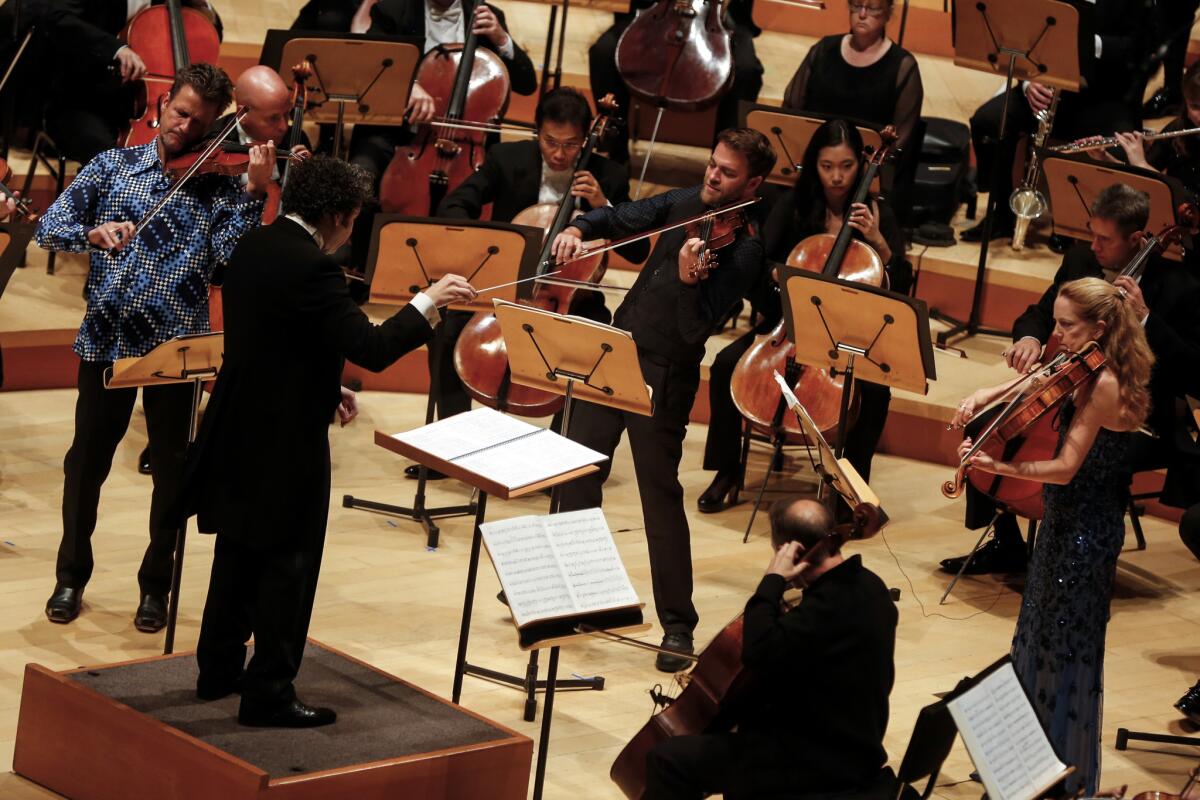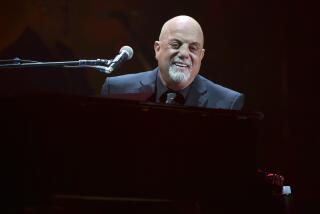Review: A serious Beethoven in John Adams’ latest ‘Absolute Jest’

We never need to go far for a little — or a lot — of Beethoven in our concert halls. The Los Angeles Philharmonic (with help from the Simón Bolívar Symphony Orchestra of Venezuela) wasn’t kidding when it began its season last year with Gustavo Dudamel conducting all nine Beethoven symphonies by calling the festival “Immortal Beethoven.”
Last weekend, Los Angeles Chamber Orchestra opened its season with Beethoven’s Seventh. Next week, Esa-Pekka Salonen begins a West Coast tour with his London orchestra, the Philharmonia, playing Beethoven’s “Eroica” in Costa Mesa, Northridge and Santa Barbara. That only scratches the Beethovenian surface.
Thursday night, the L.A. Phil did it again, opening another season with a Beethoven program at Walt Disney Concert Hall, the orchestra living up to its venturesome reputation by including John Adams in its definition of Beethoven.
The first L.A. Phil performance of Adams’ “Absolute Jest” was the considerable novelty of Dudamel’s Thursday program, to be repeated Friday and Sunday (also broadcast live Friday night on KUSC-FM and archived on the station’s website for a week). A concerto of sorts for string quartet and orchestra, “Absolute Jest” takes its material from Beethoven’s late string quartets (along with a few lifts from symphonies).
When the San Francisco Symphony premiered it 2012, I noted at the time that the concerto, written for the St. Lawrence String Quartet, was a great entertainment as long as you didn’t think too hard about it. Some of those who did think too hard wound up being offended by a musical jester toying with Beethoven’s most profound utterances.
But Adams also happened to think too hard. He reworked the score a year later, adding a new beginning. The problem had been too much Beethoven and not enough Adams. Now there is enough Adams, and “Absolute Jest” implies something that’s less a jest and more serious commentary on Beethovenian absolutism.
Still, the context needs to be carefully thought through. A beautiful new San Francisco Symphony recording that pairs “Absolute Jest” with Adams’ early, antic “Grand Pianola Music,” for instance, bolsters Adams’ trickster alter ego. Dudamel, on the other had, placed “Absolute Jest” between a magnificent performance of the “Coriolan” Overture (emphasizing Beethoven as revolutionary) and an exceptionally eloquent one of Beethoven’s Fourth Piano Concerto, with Yefim Bronfman as the incandescent soloist.
The question now became: Must we deform the past in order to preserve it? David Rieff asks the question, without undo optimism, in “In Praise of Forgetting,” a disturbing new book on historical (and human) mortality. Adams answers with the assertive assurance that, in music anyway, deformation is formation. There is little unusual, he writes in his program note, about composers conversing with history. Composers beg, borrow, steal and cover. They always have.
As “Absolute Jest” now stands, Adams borrows from himself as a marvelous way into the concerto, which once more featured the St. Lawrence, cautiously amplified. That opening sound world uses the kind of dotted rhythms that Beethoven liked in his scherzo movements but are here heard as if in a dream, an atmosphere of soft string chords, cowbells and strange-tuned piano and harp. In an enticing instant, space and consciousness are transformed, with old and new in surreal coexistence.
Once the excitable St. Lawrence enters, those dotted Beethoven rhythms from the scherzos of his late quartets and symphonies become manic. It’s like a video game, driving fast through ever changing, ever unexpected landscapes, with sudden turns and all manner of passing scenery. But you always know the country is Beethovenland. Near the end, Adams brings in monumental brass, but he leaves us as he found us, drifting off into microtonal harp and piano reverie.
Dudamel and the St. Lawrence players shared gamesters’ fast reflexes, sports car enthusiasts feeling for the road and a love of flashy colors.
In both the “Coriolan” and Fourth Piano Concerto, Dudamel put compelling emphasis on powerful, punchy orchestral weight. But he also could be delicate. When Bronfman opened the concerto with a floating tone, the orchestra came in hovering over the same cloud. Bronfman’s formidable technique made the first movement cadenza a piano show in itself. But it was the dialogue between adamant orchestra and questing piano in the slow movement where everything came together. Beethoven asks unanswerable questions, and both pianist and conductor were like actors in a Socratic dialogue, starting something that, we can now see, Adams has continued for our own time.
Dudamel began the evening meaningfully with a touching addition, the wistful waltz movement from Leonard Bernstein’s Divertimento, played — gorgeously — in memory of longtime L.A. Phil bassist Frederick Tinsley, who died suddenly on Sept. 19 and to whom the concert was dedicated.
------------
Dudamel & Yefim Bronfman
Where: Walt Disney Concert Hall, 111 S. Grand Ave., L.A.
When: 8 p.m. Friday, 2 p.m. Sunday
Tickets: $59-$190 (subject to change)
Information: (323) 850-2000, www.laphil.com
ALSO
The L.A. Phil’s opening gala at Disney Hall finds Dudamel & Co. in full jazz swing
Los Angeles Chamber Orchestra serves up a sandwich of sad and sweet
For opera lovers, at last a ‘Rake’ for L.A., bearded lady and all
More to Read
The biggest entertainment stories
Get our big stories about Hollywood, film, television, music, arts, culture and more right in your inbox as soon as they publish.
You may occasionally receive promotional content from the Los Angeles Times.







